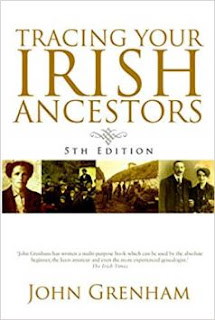 |
| Now available via the Book Depository for €22.11/£21.60 with free postage worldwide. |
As John explains in his Introduction: 'The ease of access created by digitisation has changed the balance of priority between record sources, and this is reflected in this edition.'
The running text in which he introduces the history, value, limitations and accessibility of the various record types has been subtly updated and rarely significantly extended.
There are new sections of text about Genetic Genealogy, the online arrival of the National Library of Ireland's RC Registers, an overview of the major online sites, and tips and techniques to overcome the inconsistencies of some of the search engines. The bashful author even manages to slot in an important note about the National Archives of Ireland's census database being uniquely updated with thousands and thousands of user-submitted corrections without referencing himself as the person who carried out that vital, time-consuming and probably rather mind-numbing task.
Where most of the extra 110 pages have been used is to dramatically extend Chapter 8 - Emigration and the Irish Abroad, which now includes online sources for each of Australia, New Zealand, USA, Canada and the UK, as well as an indepth bibliography for research in Africa, Australasia, India, Europe, North America and South America.
The other major winner of additional content and pagination is Chapter 13 - County Source Lists, which now reference online access to specific local records held in all the major commerical databases, county or town archives and other smaller websites.
Every Irish genealogists with any research under their belt probably already has an earlier edition of Tracing Your Irish Ancestors on their bookshelves (it'll be the well-thumbed one), and they'll be missing a trick if they don't update to the new edition with its gloriously long listings of sources. Those new to Irish family history will also make a wise investment in buying John's book, tried and trusted as it is delivering an understanding of how Irish records work and how and where to find them.
Tracing Your Irish Ancestors is published by Gill Books. It is now available in bookshops in Ireland and via Amazon UK and other online booksellers including Book Depository and Easons. It will be launched in North America in due course.
ISBN 10: 0717174654; ISBN-13: 978-0717174652. 688-pages. Paperback.
